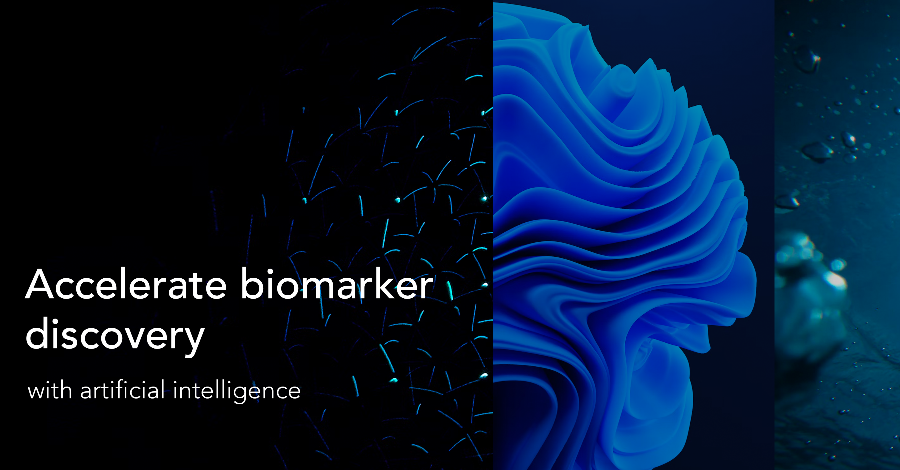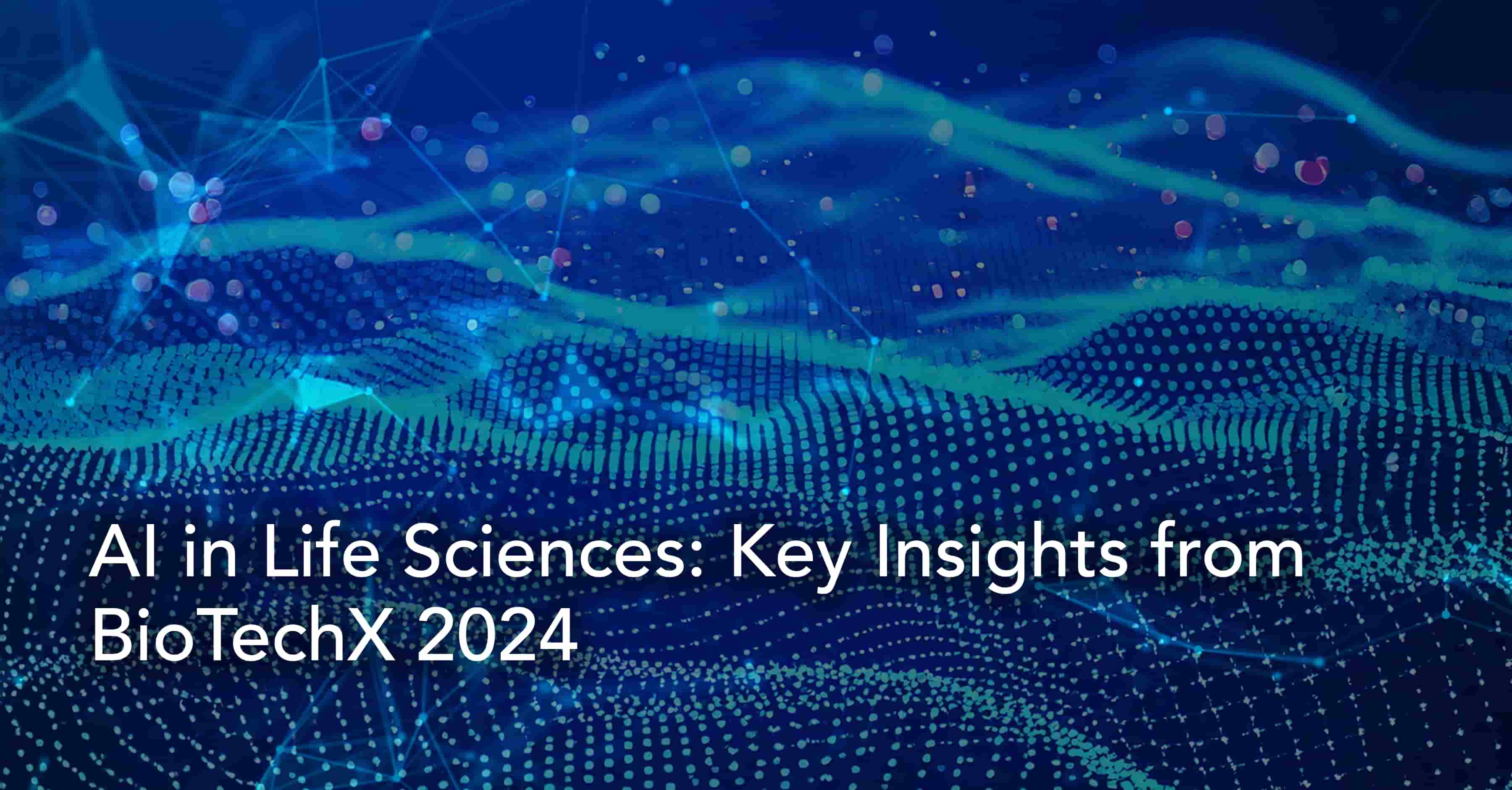Accelerate biomarker discovery with artificial intelligence

Biomarkers play a critical role in realizing the true potential of precision medicine. As accurate and measurable indicators of different biological states, including normal biological processes, pathogenic processes, and response to therapeutic intervention, they enable the categorisation of patients into subgroups and allow treatments to be tailored to specific health states. Biomarkers are powerful tools used to identify high-risk patients, improve diagnostic accuracy, assess sensitivity to targeted therapies, and predict the prognosis.
In drug development, protein biomarkers can help identify and understand novel drug targets, and reveal disease progression markers, responder signatures, diagnostic biomarkers, and potential new indications. In this way, they streamline clinical trials by helping to identify populations, monitor therapeutic response, and document a drug’s side effects.
Biomarker-driven drug development
Biomarker-guided drug development is a critical component of the emerging discipline of Translational Precision Medicine, which integrates concepts from both translational medicine for mechanism-based early drug development, and precision medicine for patient-centric late drug development to enable an end-to-end development cycle.
Today, biomarkers figure prominently in the drug discovery, development, and approval process. Between 2015 and 2019, more than half of all the drugs approved by the European Medicines Agency (EMA) and Food and Drug Administration (FDA) used at least one biomarker during development. Biomarkers have the potential to facilitate a more adaptive development paradigm that can improve the quality and safety of drugs, accelerate approvals, and reduce development costs. In fact, the FDA has designated biomarkers as a key medical product development tool that will reduce stagnation, spur development innovation, and eventually determine the success of personalised medicine.
However, the scope of biomarker discovery is constantly expanding. The field already encompasses a wide range of omics data sets such as genomics, proteomics, metabolomics, and epigenetics. At the same time, emerging high-throughput, data-gathering technologies such as single-cell next generation sequencing (NGS), liquid biopsy, microbiomics, and radiomics are generating enormous volumes of data at a relatively low cost. As a result, advanced AI technologies are becoming central to addressing the overload from omics, clinical, electronic health records (EHRs), and digital biomarker data sources.
AI/ML in biomarker discovery
Conventional approaches to drug development focus on multiple objectives including bioavailability, toxicity, and ADME (absorption, distribution, metabolism, and excretion) but not specifically on patient heterogeneity. However, with precision medicine emphasising the customization of treatments to specific patient profiles, the need to tailor drug development to the heterogeneity of patients has had a significant impact on drug discovery pipelines.
Most precision medicine applications still rely on a limited number of molecular biomarkers in the early drug discovery process. However, a fully personalised approach to drug design requires capturing the full molecular landscape of patients so that medicines can be tailored to heterogeneous molecular profiles. This requires innovative new analysis strategies that are currently being powered by AI technologies.
There has been a paradigm shift in biomarker discovery and drug design based on the increasing adoption of AI technologies. For instance, univariate biomarkers still form the basis for even some of the most advanced approaches to patient stratification. Moreover, several complex diseases often lack distinct univariate genetic biomarker indications of drug sensitivity.
AI tools have helped expand the biomarker landscape and uncover drug and disease patterns across complex layers of molecular, chemical, and clinical information. In many complex cancers, without clear genetic biomarker indications, ML (machine learning) techniques have been successfully used to determine the optimal number of signatures relevant for biological interpretability and clinical translatability. In fact, the potential for these advanced techniques to more accurately identify disease subtypes on the basis of more interpretable and actionable biomarkers is opening up new possibilities in patient stratification and subtype-specific treatment design.
Additionally, there are volumes of data that can be valuable for biomarker discovery that are lying unused because they are capabilities of traditional statistical analyses and tools. Cancer care, for instance, generates huge volumes of routine imaging data that could be used for the development of cancer imaging biomarkers. But much of the imaging data, from CT, MRI, or PET scans, are left unread because of the limitations of traditional two-dimensional review techniques.
The emerging field of radiomics enables the extraction of different structural and phenotypic characteristics of lesions and tumours from standard medical images that are not optically visible to conventional image reading techniques. Radiomics uses AI algorithms to extract previously unseen data patterns that can yield precise insights for the discovery of new biomarkers. AI-enabled imaging biomarkers can help improve diagnostic accuracy, predict the likelihood of treatment response, and identify clinical endpoints. And though until now radiomics has been applied extensively in oncology, it is now emerging as a critical component of the ‘multi-omics’ approach to medicine across multiple clinical domains.
Precision medicine and AI-enabled biomarker discovery
Biomarkers are essential to a deeper understanding of the molecular processes of diseases, which in turn will be critical to the evolution of precision medicine. AI-driven biomarker discovery will be a key determinant of the success of biomarker-guided drug development with the potential to predict response, enhance the success rate of clinical trials, and reduce the time and cost of drug discovery and development. Though statistical methods created the foundation for precision medicine, the exponential expansion of the molecular, chemical, and clinical data landscape has led to the increased adoption of AI models in biomarker discovery.
Today, AI-driven biomarker discovery is an established component in pharmacogenomics, especially cancer pharmacogenomics, and is predominantly focused on research and early-stage drug development. Soon the power of AI will expand across all stages of drug discovery and development and create the opportunity for an AI-driven treatment plan based on patient data and biomarker analysis.
Subscribe to our Blog and get new articles right after publication into your inbox.
Subscribe to our blog:






